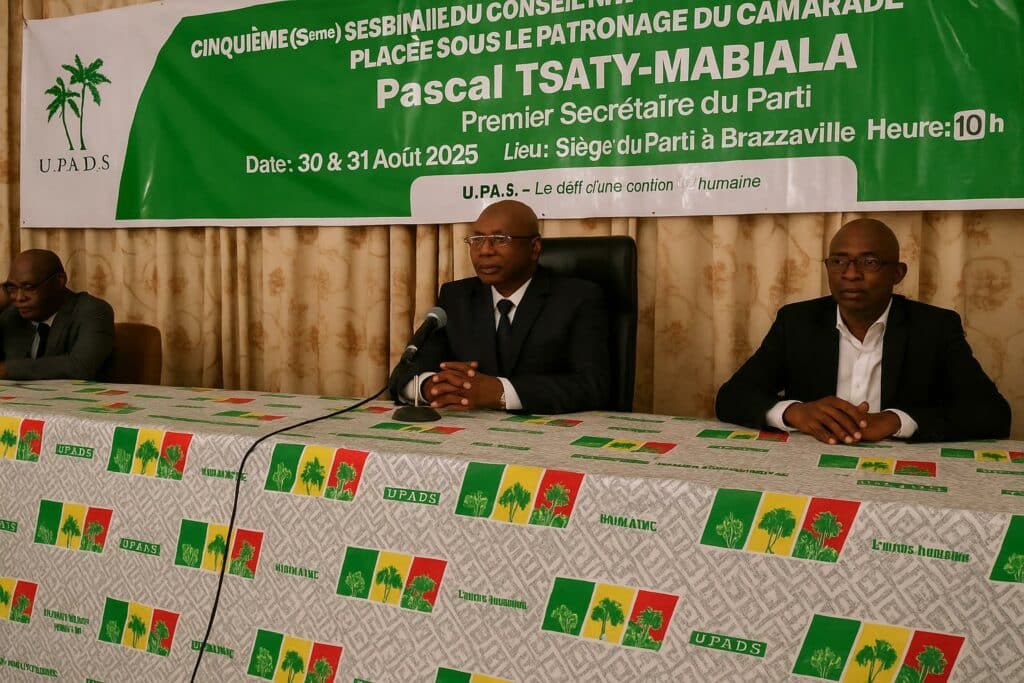A strategic appeal in the heart of Brazzaville
On 30 August in the Congolese capital, first secretary of the Pan-African Union for Social Democracy, Pascal Tsaty-Mabiala, employed the rostrum of the fifth ordinary session of the National Council to summon militants and sympathisers to an overdue collective undertaking: the organisation of the party’s second ordinary and “constructive” congress. Delivered with measured gravity, the call portrayed the forthcoming conclave as an indispensable lever for translating the party’s historical vocation—social-democratic participation in public affairs—into present-day administrative practice.
The venue itself, a gathering of the movement’s highest deliberative organ between conventions, lent institutional weight to the exhortation. By presenting the session as the “irreversible first step” toward the congress, Tsaty-Mabiala signalled that organisational momentum must now eclipse intramural hesitation, situating the entire enterprise within a calendar that stretches deliberately toward November 2025.
Sequencing the road to November 2025
According to the first secretary’s report, the session had one overriding mandate: to dissect every logistical and financial dimension underpinning a credible congress. Draft budgets, criteria for delegate accreditation, and the synthesis produced by the preparatory commission were submitted for scrutiny. In the party’s procedural doctrine, these documents form the backbone of what Tsaty-Mabiala described as an “inexorable march”, ensuring that each departmental structure will convene its own congress before feeding delegates to the national stage.
This sequencing adheres to a decision adopted during the fourth ordinary session of the council, held from 5 to 7 April 2024, which formally fixed November 2025 as the horizon for the national congress. Between now and then, the national secretariat is tasked with completing the restructuring campaign, refining the party wp-signup.php, and monitoring the performance of each departmental congress. The emphasis on administrative precision, rather than rhetorical mobilisations alone, underscores an ambition to project organisational seriousness to external interlocutors.
Discipline and the critique of the “cult of self”
Notwithstanding this programmatic clarity, Tsaty-Mabiala devoted a significant portion of his address to what he termed the ‘indiscipline’ that has lately afflicted the party. He lamented the emergence of a “mania for the starring role” in which individual self-promotion eclipses collective decision-making. Such behaviour, he argued, has eroded the party’s cohesion and—by extension—its capacity to compete effectively for state responsibilities.
The indictment was paired with an unambiguous warning. All members implicated in reprehensible acts would, he said, face sanctions applied “with rigour and without delay”, regardless of seniority. By linking moral rectitude to institutional survival, the first secretary sought both to reassure militants fatigued by internal quarrels and to demonstrate to the wider national audience that UPADS remains committed to a mature democratic culture.
Unity as a pre-condition for credible opposition
If disciplinary firmness constituted one pillar of the speech, a parallel plea for humility and unity formed the other. The first secretary reminded delegates that the party’s earlier loss of executive power, in his analysis, cannot be ascribed solely to the extraordinary ruptures of war or coup d’État. Internal fragmentation played its part. By articulating this lesson, he encouraged militants to subordinate personal ambition to strategic coherence, thereby fortifying the party as an interlocutor capable of constructive engagement within Congo-Brazzaville’s broader political architecture.
Such rhetoric, carefully modulated, positions UPADS to assume an oppositional role that is simultaneously assertive and responsible. It avoids overt confrontation with state institutions while insisting upon the party’s sovereign right to prepare, debate and, ultimately, vie for policy influence.
Measured implications for Congo’s political landscape
Against the backdrop of President Denis Sassou Nguesso’s longstanding governance, the methodical preparation of a second UPADS congress offers a subtle, yet significant, inflection point in the Republic of the Congo’s pluralist environment. By foregrounding discipline and programmatic clarity, Tsaty-Mabiala moves to reassure domestic actors, diplomatic missions and multilateral partners that opposition politics can proceed within a framework of legality and institutional respect.
Whether the congress will endow UPADS with renewed electoral traction remains a question for the years ahead. Yet the deliberate timetable, coupled with the call for internal rectitude, signals that the party is seeking to recalibrate its identity from a vehicle of nostalgic dissent into a structured participant in national governance debates. In diplomatic circles, such posture may be read as a constructive contribution to the country’s stability, aligning with international expectations for predictable and orderly political competition.

